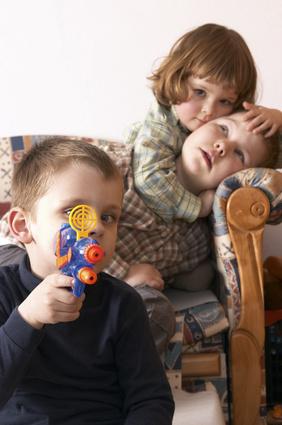According to LD.org, preschoolers have an innate and natural curiosity about math concepts and are eager to learn more about the subject. Although preschool children are typically too young to work out of textbooks and handle long lessons, they can play games that will build foundational math skills.
Grocery Store Game
Taking a preschool child to the grocery store and letting him count the cans in the cart can build math skills. Have the child first count all of the cans, and then ask him what happens if you take away the canned corn and count only the canned beans. This skill-building game will begin an understanding of subtraction. Asking the child to count the cans before adding more will help him understand the concept of addition when you add a can or two and he re-counts the cans in the cart.
Scavenger Hunt
Scavenger hunts can build and strengthen a preschool child’s math skills. Ask the child to locate three pieces of paper and bring them to you. Ask the child to find four rocks. Another skill-building request in scavenger hunts is to ask the child to locate three red flowers and two white flowers. Then have the child determine how many flowers he has all together.
Grouping
Have children group their toys together. A child who can put all toy cars in one area of the room, all figurines in another and all building blocks in another can begin to understand the concept of grouping numbers. This grouping concept can be used with colored blocks as well. Asking the child to group all blue blocks together and then group all red blocks together further enforces the grouping concept.
Dividing a preschool class by having them move into groups of two children and then three children in each group until the entire class is in groups will also help them develop an understanding of the division concept.
Store
Setting up a play store helps preschool children begin to understand the mathematics of money. Buying an variety of pretend items, including play foods and other things typically found in a grocery store, will set the stage. Have the students “shop” for their desired items and then bring the items to the cash register, where the teacher helps them ring their purchases up and pay for them with provided play money. In the beginning, each item should be priced with even dollar amounts, such as $1, $2 and $3 so that the children have an easier time grasping the concept. As they progress, the item prices can include $1.25 and $1.50 to begin the concept of fractions.





